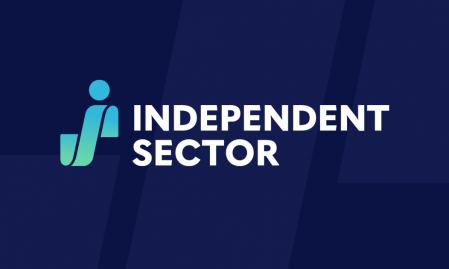The IS Board of Directors adopted the Guiding Principles for Public Policy on Charitable Giving in September 2012. The principles focus on the role of tax policy in encouraging charitable giving, the importance of sustaining the diversity and independence of the sector, and the sector’s commitment to honor the public trust through transparency and accountability. These principles will be used to guide the development and assessment of legislative proposals to ensure that America’s strong tradition of charitable giving is sustained and strengthened.
Introduction
Independent Sector and its members share a commitment to building a just and inclusive society of active citizens, vibrant communities, a healthy democracy, and effective institutions.
As Americans, we continually balance two impulses fundamental to that society:
- The energetic pursuit of individual and private interests, and
- The building and strengthening of communities committed to the mutual dignity, worth and well-being of each individual and the larger public that unites us.
As representatives of our nation’s charitable and philanthropic sector, we affirm the importance to our society of both private and public initiative. We recognize the roles and responsibilities that the sector fulfills in our American society by virtue of how the sector uniquely manifests characteristics that are both private and public. We value how the sector works in dynamic equilibrium with the government and private sectors while maintaining critical independence as a source of citizen engagement, community empowerment, and opportunities for innovation, diversely pluralistic views and operations, and immediate and long term perspectives.
Charitable giving and volunteering are integral to the sector and, as such, are vital to sustaining the American vision of a free and democratic society. Charitable giving and volunteering are clear expressions of private initiative serving public good. Accordingly, public policy should actively encourage both of these activities. In addition, the sector recognizes that it must continue to earn the support of individuals who give their time and money by sustaining high standards of governance, transparency, accountability, ethical conduct and compliance with the law.
Such views of the sector must be part of what informs debate and decision-making about policies that affect charitable giving, which is the lifeblood of the sector. To help bring these high level views into clearer focus are our Core Beliefs on the Important Role of the Charitable and Philanthropic Sector in Society. These Core Beliefs, which follow immediately below, help shape the yet more specific principles provided thereafter that are intended to help guide public policy decision-making about charitable giving. In this way, all involved can ensure that public policy furthers, rather than detracts from, the sector’s distinctively American values and their expression.
The Important Role of the Charitable and Philanthropic Sector in Society
A strong and healthy charitable and philanthropic sector is vital to democracy, America’s quality of life, and free society. The sector (also called the charitable, nonprofit, voluntary, social, NGO or independent sector) nurtures and sustains two fundamental prerequisites for a free society: an engaged and public-spirited citizenry and a rich network of autonomous communities working to advance the public good. Through its participation in and support of the organizations of the charitable and philanthropic sector, the American people give life to some of their most cherished values: freedom of speech, association, and religion; pluralism; the responsibilities of civic participation and citizenship; the dignity and worth of each and every individual; justice; and building community.
Within America’s three-sector society, a strong charitable and philanthropic sector, a healthy business sector, and an effective government sector all play critical roles. The charitable and philanthropic sector sustains a broad range of vital public-benefit activities. Many of these activities are undertaken in partnership with government and business, and the charitable sector also plays a role in holding business and government accountable. Similarly, government has oversight over business and charitable sectors, ensuring accountability to the public. Through the charitable sector, Americans both help to shape government policy and support private initiatives for the public good that complement the essential work of government. America works best when each sector understands, respects, and supports the vital functions of other sectors.
The charitable and philanthropic sector depends on a strong base of charitable giving. Without a strong base of private charitable contributions, the charitable and philanthropic sector could not sustain the important public benefit activities it provides in communities across the country and around the world. While earned income and government support are vitally important elements of the charitable sector’s income stream, it is private charitable donations that give the sector its credibility, value and relevance to our communities. Thus, society has a fundamental interest in encouraging charitable support.
Charitable giving depends on broad-based public trust in the charitable and philanthropic sector. The organizations of the charitable and philanthropic sector have earned the public’s trust by being effective in their work, accountable to their multiple constituencies, and good stewards of their resources. Americans’ generous support of the independent sector depends on this trust, and to preserve this trust, charitable and philanthropic organizations continually strive to maintain the highest standards of stewardship. Appropriate government regulation is also vital to preserving public trust in the sector.
As Americans, we aspire to become more generous. On average, Americans give about 2 percent of their incomes to charity. While this compares favorably to charitable giving in other countries, it surely does not represent the full potential of our generosity. Charitable giving is not only vital to America’s charitable and philanthropic organizations and the people and causes they serve, but it is also strongly correlated with high rates of volunteering and other forms of civic engagement. Strengthening the commitment to charitable giving is an essential and important step toward more fully realizing our vision of a just, compassionate, and free society.
Guiding Principles for Public Policy on Charitable Giving
Many factors influence charitable giving and public policy is certainly one of them. While recognizing the importance of considerations such as economic growth, equity and efficiency, we believe that the following principles should guide the formulation of tax policy as it affects charitable giving.
I. Encouraging Giving
Because of the important role charities play in giving life to America’s most cherished values, our society has a fundamental interest in encouraging charitable giving. Research conducted by Independent Sector and others has shown conclusively that while the decision whether to give is not fundamentally affected by tax policy, the decision about how much to give, and when to give, is. Tax policy should create appropriate tax-based incentives for charitable giving.
- Public policy, including tax policy, should encourage giving by all Americans. Current tax law does not provide such a universal incentive for giving; only the roughly 30 percent of taxpayers who itemize their deductions can deduct charitable contributions from their taxable income. The vast majority of Americans who do not itemize receive no tax incentive for charitable giving.
- Charitable contributions should not be included in an individual’s adjusted gross income. Individuals giving to charity are foregoing private consumption and voluntarily committing their own resources to the public good. For income tax purposes, the donor’s income net of the gift – that is, the income available for private consumption – represents a much fairer basis than pre-gift income for determining the donor’s tax obligation. As such, charitable giving should not be considered part of an individual’s adjusted gross income.
- The equitable treatment of taxpayers in all income brackets through tax code provisions that encourage charitable giving should be preserved. The historical interaction of the charitable deduction with the federal income tax’s progressive rate structure has meant that, regardless of a donor’s income, voluntary contributions to charity are not subject to tax. This is not a social inequity, but rather a reasonable byproduct of the appropriate treatment of charitable contributions within a progressive tax system. The current favorable tax rule for charitable contributions of appreciated property and the deductibility of charitable contributions in determining liability for estate and gift taxes are also proven and important means of encouraging giving.
- Do no harm. Giving the importance to society of charitable giving, policymakers considering possible tax law changes should give great weight to potential adverse effects on charitable giving. While other issues will, and undoubtedly should, be given high priority when assessing tax policy, the effect of any policy change on charitable giving should be taken into consideration.
- Tax incentives for charitable giving should be structured to optimize their economic efficiency, equity, ease of administration, and simplicity, consistent with providing appropriately strong encouragement for giving. Efficiency (in this context, stimulating increased charitable giving with as little tax revenue loss to the Treasury as possible), equity, ease of administration, and simplicity are desirable attributes of all tax rules, including the tax rules on charitable giving. These values should be advanced whenever this can be done without unduly compromising other more fundamental principles including, most importantly, the concern noted above that money given to charity should not be included in the tax base in determining a person’s tax liability.
II. Affirming Pluralism
While government collects and allocates resources based on majority will, the great strength of America’s charities is that they allow individuals and groups voluntarily to commit their time, money, and creativity to advancing their own vision of the greater good. As a society, we have a profound interest in sustaining this rich diversity of the charitable sector.
- Public Policy should continue to preserve the broad concept of charity, as it is currently defined. America’s charitable sector is strong and vibrant in large part because the legal framework has encouraged a broad range of private initiatives for the public good, allowing individuals to form and support tax-favored charities for a wide variety of purposes that advance the public good. This broad concept of charity should be preserved and encouraged.
- Government tax policy should not influence donors to favor a particular type of charitable activity. One of the great strengths of the charitable sector is that resources are allocated by the autonomous decisions of individual donors. Government should not undermine that donor autonomy by singling out particular charitable activities as deserving greater tax support. While government does influence giving in some measure by determining what organizations qualify for receiving tax-deductible contributions and by certain other rules that set percentage-of-income deduction limits, it should preserve private choice in giving and not try to direct private charitable giving by creating greater tax incentives for certain types of charitable activity.
- Government should recognize the importance of preserving charities’ independence and the importance of a strong base of contributed support as essential to achieving this end. A major strength of the charitable deduction, as compared with charitable tax credits or direct government funding of charities, is that the deduction is best understood (for the reasons noted above) as primarily an appropriate adjustment in defining the tax base, rather than as a government subsidy. Accordingly, government should not impose restrictions on the receipt of charitable contributions that undermine the appropriate autonomy of charities, including the ability of charities to advocate public policy positions or to control their internal affairs.
III. Honoring the Public Trust
The continued support of individuals who give their time and money to charity depends on a high level of public trust and confidence that charities will be good stewards of these resources. The charitable sector recognizes the importance of effective governance, transparency, accountability, ethical conduct and compliance with the law. Ensuring this result requires both a strong commitment by charities to self-regulation and effective oversight by government.
- The charitable and philanthropic community is committed to good governance, effective stewardship of charitable resources, and ethical conduct. Self-regulation by the sector is an important complement to government oversight and regulation. Independent Sector’s Principles for Good Governance and Ethical Practice and other resources are used by public charities and private foundations to enhance the accountability and transparency of their operations and ensure that they operate ethically. The nonprofit sector also supports an array of watchdog groups, management support groups, and infrastructure organizations that collectively serve to ensure accountability, build capacity, and promote excellence within nonprofit organizations. These resources and organizations play a critical role in helping charities go beyond the requirements of the law to achieve high standards of conduct and quality.
- Government appropriately requires charities to publicly report sufficient operational and financial information to enable effective oversight and allow the public to make an informed judgment about the activities of a charitable organization. Significantly expanded nonprofit reporting requirements were recommended by the Panel on the Nonprofit Sector created by Independent Sector in 2005; subsequently implemented through law and regulation; and have, since 2007, served to ensure the transparency necessary for effective government oversight and public confidence. Any further modifications to reporting requirements should strike a balance between adequate public disclosure to maintain public trust, and imposing excessively burdensome or intrusive regulations on nonprofit organizations.
- Federal and state governments should maintain effective and efficient oversight of charities and charitable solicitation. Providing clear guidance to nonprofit organizations on the interpretation of laws and regulations is particularly important. Government entities charged with the oversight of charities need adequate funding, effective leadership, and appropriate coordination in order to carry out their responsibility to protect the public interest, which ultimately benefits the nonprofit sector as a whole.



